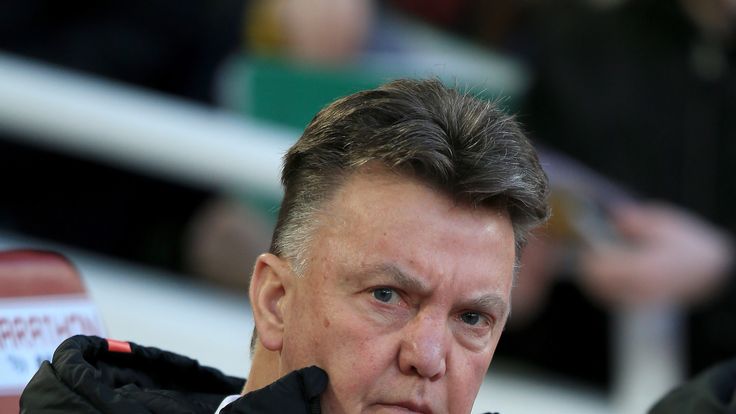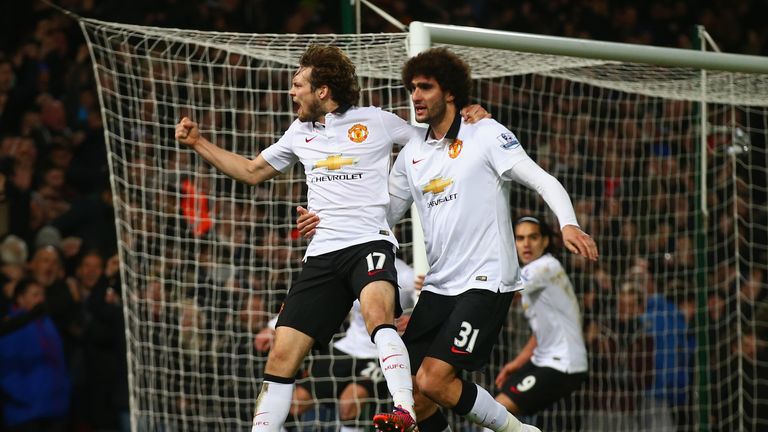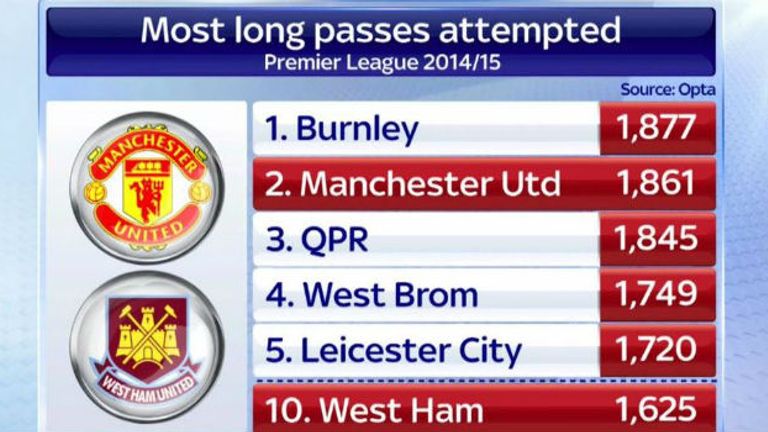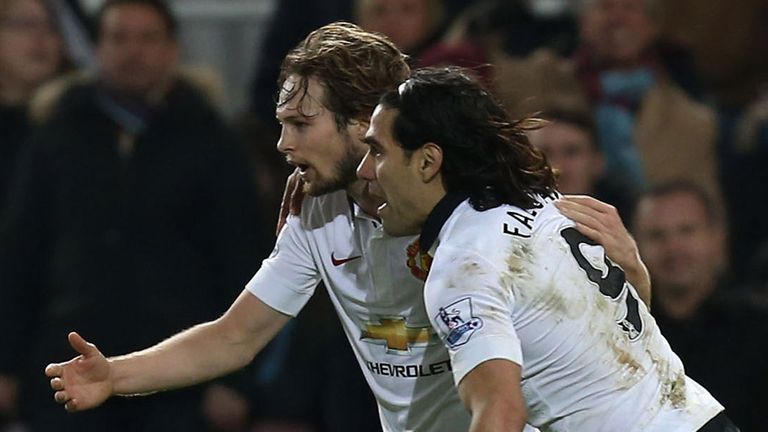Premier League: Louis van Gaal's long-ball pragmatism can only take Manchester United so far

Monday 9 February 2015 15:21, UK
Manchester United were accused of being a long-ball team after their 1-1 draw with West Ham at Upton Park on Sunday. Adam Bate looks at the stats that suggest that’s true as well as the wider problems of Louis van Gaal’s pragmatic approach…
When Manchester United appointed Louis van Gaal in the summer, much of the focus was on the manager’s philosophy. Here was a coach with grand ideas and a record of delivering. Van Gaal hasn’t been shy of using that P word since taking the reins either.
But perhaps it’s the verdict of Jose Mourinho that appears most prescient as we approach the latter stages of Van Gaal’s first season in charge. Mourinho was the Dutchman’s assistant at Barcelona and had a different P word in mind when it came to his old colleague. “He is honest,” said the Chelsea manager. “And pragmatic.” Well, they do say it takes one to know one.
It should not come as a shock to Manchester United supporters. Van Gaal’s Netherlands team played over 100 more long balls than any other team at the World Cup last summer. That wasn’t only because they went so deep into the tournament - they averaged 80 of them per game. The next most by any quarter-final team was 65 per game by Costa Rica.
Evidently, the Total Football cliché isn’t the full story when it comes to Van Gaal. This is a pragmatist willing to adapt his approach, not some philosophy lecturer who understands the game in the abstract; a coach who cut his teeth as assistant under Hans Eijkenbroek at AZ in the 1980s, battling to avoid relegation by firing balls at players on the training ground to test their mettle.
Trending
- World Darts Championship: Clemens, Lukeman in action on day five LIVE!
- Transfer Centre LIVE! 'Saudi could offer Rashford way out of Man Utd'
- Five years of Arteta: Arsenal transformed but what's next?
- The Friedkin Group complete Everton takeover
- World Darts Championship schedule: Smith in action on Thursday
- Lawson confirmed as Verstappen's Red Bull team-mate for 2025
- Usyk vs Fury 2: Start time, ring walks, undercard and odds
- Celtic consider move to re-sign Arsenal left-back Tierney
- Nunez and Elliott strike as Liverpool battle past Southampton
- Papers: Gravenberch set to stay at Liverpool amid Real Madrid links
Of course, Mourinho did not mean it as a criticism. The view was likely expressed with a similar dollop of irony to that which saw Sam Allardyce pointedly discussing Van Gaal’s long-ball tactics following Sunday’s 1-1 draw with his West Ham team. “It was just a punt up the middle,” said Allardyce of United’s late equaliser, sounding like the burglar who’d come home from a job well done to find his own home had been ransacked.
What Van Gaal cannot deny is that this was long-ball football. There has been plenty of it from Manchester United this season too. Only Burnley have launched the ball forwards more times than his team. What the United boss could argue is that this is the most effective way of getting the result in the circumstances. Particularly when it comes to Marouane Fellaini.
While there’s little sense that Van Gaal would have blown the summer budget on the tall Belgian as his predecessor did in 2013, he has at least had the conviction to utilise the midfield powerhouse in the most appropriate way. “I think with Fellaini you have to change your style, and we did, and because of Fellaini we have created a lot of chances,” he told Sky Sports.
“I have done that already a lot of times with Fellaini, so that is not new,” he added in his post-match press conference. “With him we have more power. With Adnan (Januzaj) and (Angel) Di Maria, we have more creative players. That's why the second ball you cannot always win. We have to win that second ball otherwise I will always have to line-up players like Fellaini.”
This talk of second balls might not sit too easily with some among the United support. It’s the focus that might be expected of the West Ham manager not the Manchester United boss. Allardyce might like to regard the perceived disdain for the long-ball game as a curious affectation that has seeped into the English game and should be regarded as contemptible as diving or wearing gloves, but the truth is surely that the public recognise what a successful team looks like.
They know, of course, that such an emphasis can sustain a team in mid-table safety – Tony Pulis territory - but they are equally aware that this is not the natural habit of the very best. The last three Premier League champions – as well as both Chelsea and Manchester City this season – rank among the bottom five for long balls per game, despite the fact that they make far more passes than the average team overall.
Perhaps the pertinent question here is whether United are doing it out of choice or necessity. Van Gaal’s assessment would appear to be that his decisions are driven by the latter and the comments of goalscorer Daley Blind to Sky Sports in his post-match interview would certainly seem to suggest that the passing game is proving beyond them. “The first half was really a battle,” said Blind. “We can’t really play the ball how we want. We can’t play possession.”
When will they be able to play it? After all, we were supposed to be seeing signs of something exciting emerging by now. Instead, almost seven months into a project that Van Gaal had asked to be judged in three, the lack of a coherent tactical approach remains a concern. When the possession does come it is too slow and is orchestrated by those multi-functional players for whom the word is beginning to feel like a euphemism for being played out of position.
For all the concerns, the biggest compliment that could be paid to Van Gaal’s Manchester United is there for all to see in the form of the league table. Residing in the top four while those immediately below them must contend with European distractions, there is reason to believe this team can stagger over the finishing line and the safe haven of the latest spending spree in the summer. It’s not that this season was supposed to bring more wins. Just that it was supposed to bring more.
David Moyes was accused of lurching from game to game, like a man hoping the bills would pay themselves, but while Van Gaal walks and talks like a winner there’s little obvious sense of a greater scope to his vision. After watching Radamel Falcao – surely the definitive short-term acquisition – squander his latest clear opportunity, Van Gaal could only say that “the goal is coming in the next match”. But for this United team, the signs are that tomorrow never comes.







